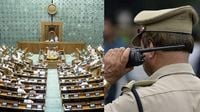Security measures were heightened in Muzaffarnagar, Uttar Pradesh, on April 2, 2025, following the introduction of the Waqf Amendment Bill in Parliament. District Magistrate Umesh Mishra and Senior Superintendent of Police (SSP) Abhishek Singh led the district administration in a proactive response to ensure public safety in sensitive areas.
As the Waqf (Amendment) Bill was presented in the Lok Sabha by Union Minister Kiren Rijiju, discussions erupted among various political leaders, with opposition parties and several Muslim organizations voicing their disapproval of the legislation. The bill aims to amend provisions related to the management and governance of Waqf properties across India, which has sparked significant debate and concern.
In anticipation of potential unrest, the district administration organized a flag march through key locations in Muzaffarnagar, including the Khalapar area, to reassure the public and maintain order. Authorities reported that the situation remained peaceful, with no incidents of violence or unrest noted during the heightened security measures.
In addition to the flag march, local law enforcement employed drone surveillance to monitor the situation effectively. This technological approach aims to enhance situational awareness and allow for rapid responses if necessary. The use of drones is part of a broader strategy to maintain vigilance across the region as tensions surrounding the Waqf Bill mount.
In Sambhal, another district in Uttar Pradesh, similar measures were taken under the leadership of the local SSP. Flag marches were conducted in the Sambhal and Nakhasa Thana areas, with Additional Superintendent of Police Shrish Chandra stating, "Everywhere is peaceful. The police are fully alert, and we are monitoring social media posts closely to prevent any misinformation or incitement to violence."
The Waqf Board in India holds significant assets, with the Ministry of Minority Affairs reporting in December 2022 that it manages approximately 865,644 registered properties. This vast portfolio represents an estimated 9.4 lakh acres of land, valued at around 1.2 lakh crore rupees. The board’s extensive holdings make it one of the largest landowners in the country, second only to the Indian Railways and the Ministry of Defence.
As discussions surrounding the Waqf Amendment Bill continue in Parliament, the police presence remains heightened in several districts, including Agra and Mathura, where officials have increased patrols and monitoring efforts. In Agra, police and Provincial Armed Constabulary (PAC) units were deployed around the Jama Masjid area, while in Mathura, patrols were intensified in mixed-population neighborhoods such as Deeg Gate and Matia Gate.
In the state capital, Lucknow, authorities have identified eleven sensitive locations, including Satkhanda and Rumi Gate, where additional surveillance measures are in place. The Rapid Action Force (RAF), Sashastra Seema Bal (SSB), and PAC conducted route marches to ensure public safety and deter any potential disturbances.
The introduction of the Waqf Amendment Bill has ignited a fiery debate in the Indian political landscape, with proponents arguing that the amendments will streamline the management of Waqf properties, while critics fear it may undermine the autonomy and rights of the Muslim community regarding their religious endowments.
As the bill moves through the legislative process, the government appears confident of its passage, given the majority it holds in both houses of Parliament. However, the backlash from opposition parties and civil society groups indicates that the conversation surrounding the bill is far from over.
In a rapidly changing political environment, the implications of the Waqf Amendment Bill extend beyond legislative chambers, affecting communities across Uttar Pradesh and beyond. The heightened security measures in Muzaffarnagar and other districts reflect the government's commitment to maintaining public order amidst rising tensions over the proposed amendments.
As discussions unfold, the need for dialogue and understanding between differing factions remains crucial. The Waqf Amendment Bill is not just a legislative issue; it represents broader questions of community rights, governance, and the role of religious institutions in contemporary India.
With the police on high alert and community leaders urging calm, the coming days will be critical in shaping the narrative around the Waqf Amendment Bill and its potential impact on India's diverse social fabric. The eyes of the nation will undoubtedly remain fixed on this unfolding story as it develops.





